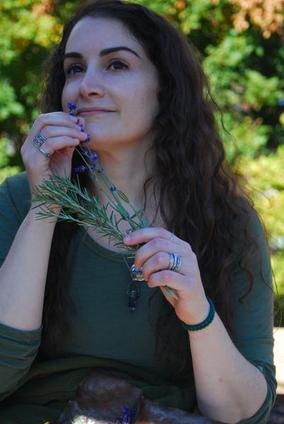Q & A with Sheryl Lynn Gibbs
We’re huge proponents of green and chemical-free beauty at DailyHap. Here, Sheryl Lynn Gibbs answers your pressing questions about “green beauty” standards. Sheryl is a Holistic Aesthetician and Cosmetologist who has studied aromatherapy, nutrition, homeopathy, anti-aging, herbal medicine, Ayurveda, and cosmetic chemistry. Sheryl’s Sevani is an holistic beauty line formulated to nourish skin and the planet.
Q: Selecting a natural and organic product can be so confusing, how do we know how to select a truly natural product?
A: Unfortunately the term “natural” is not regulated. It can be very deceiving as a product may contain as little as 1% of a natural ingredient, yet the average consumer would be unaware. This deceiving tactic is very common in the marketplace, however today’s well-informed consumers are becoming much more ingredient-savvy. Additionally, some of the most well-respected specialty retail chains are now imposing stricter standards for anything that carries a “natural” label.
Organic on the other hand, does require certification. Any product in the United States that is labeled as “100% organic”, “organic”, or “made with organic ingredients”, must be certified. Only 95% and higher organic products are able to display the USDA organic seal on their labels. Not all useful ingredients are available certified organic, yet this does not always mean the ingredient was contaminated with a chemical. In some cases they are wild-crafted or grown at a small farm.
Avoiding controversial toxic ingredients is more important in my opinion then seeking an organic product. A good rule of thumb to consider: if a product is labeled “natural” yet is priced in line with the least-expensive products on store shelves, chances are it is not truly natural. Read ingredients and become informed.
Q: What made you go into the green beauty industry?
A: As a child I suffered with extremely sensitive skin. When my grandmother from Italy came to live with us and started an herb garden, she would make tinctures and massage them on my skin and it made a considerable difference. This inspired me to work with natural remedies.
I studied cosmetology as a teenager and for over 25 years I have been customizing clients’ facial and scalp treatments with botanicals and anti-inflammatory ingredients to minimize negative effects. There are over 80,000 chemicals on the market today but nearly 20% of them are kept secret according to the Environmental Protection Agency. Diseases of the skin and allergies are on the rise and have increased dramatically during the past few decades. Green beauty is the best solution!
Q: What are some key ingredients to look for right now when shopping for natural products?
A: The key is to avoid terms such as “natural” on labels alone and become more familiar with the highest quality natural ingredients. Knowing what to avoid may be easier then knowing what to look for. Highly controversial ingredients to consider avoiding include parabens, silicones, hydroquinone, DEA, TEA, Phthalates, SLS, mineral oil, propylene and butylene glycol, to name just a few.
Q: Just because a product is natural does that guarantee that it’s safe?
A: Absolutely not. A good example here would be that of Poison Ivy. While it may be natural, it is certainly not our friend in most cases (homeopathy being the exception). Of course many known natural ingredients such as these are not in beauty products, because we know of their negative effects.
We are all complex beings that have unique sensitivities or allergies. Allergic reactions are possible to even the most pure and natural ingredients. However, they are often less common. As with any ingredient, just because the first 50 people that use it may have no reaction cannot possibly guarantee that number 51 will not. As a result I work with anti-inflammatory ingredients that have a history of minimizing sensitivities. I always recommend that people slowly introduce new products and note any changes. Sometimes we misinterpret our skin acclimating to new products as an allergy when it is not.
Q: What are the benefits of living a green lifestyle?
A: Knowing that you are contributing to a healthier planet and lifestyle is beneficial to all. It is never too late for change and living the green lifestyle shows that we are committed to the very planet that we should show gratitude for.
Mother nature provided us with an abundance of beautiful land, food, and water so it only makes sense to treat it with respect.

